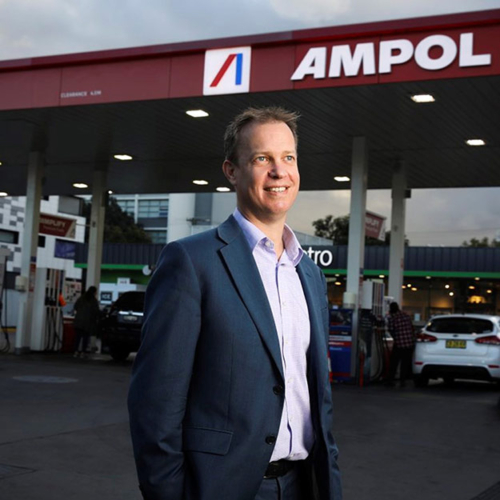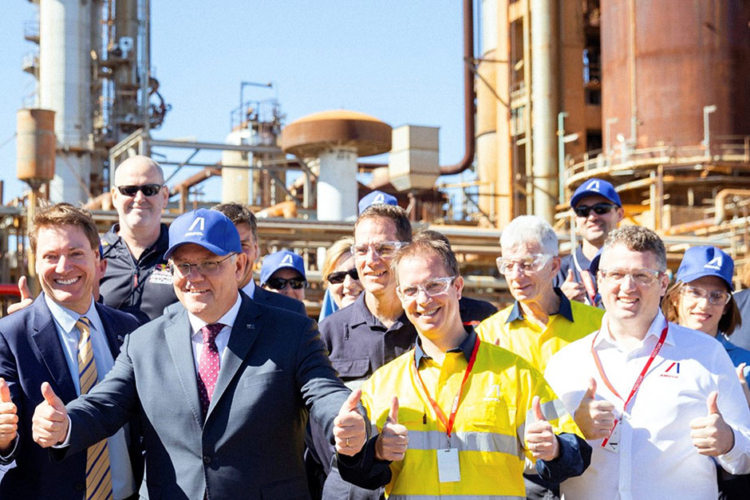08/07/21; Financial Review

Just a year into the job, Matt Halliday is dealing with an unprecedented fall in demand, rebranding from Caltex to Ampol, negotiating to keep an oil refinery open and launched an ambitious green plan.
Matt Halliday says Ampol will play a role in making people “more confident” to transition to electric cars.
When you pull up in your car to a petrol station in the year 2030, you can expect things to look a bit different.
The petrol pumps will still be there but you can expect to find refuelling stations for hydrogen cars and charging points for electric cars too – transforming forecourts into energy distribution stations.
Ampol chief executive Matthew Halliday is also expanding the company’s supermarket footprint, a trend that will make the humble petrol station more like a one-stop destination for household needs. Ampol has already launched 10 larger grocery stores in partnership with Woolworths across Sydney, with the first store launching in Melbourne this month.
“Can a petrol company today transition for tomorrow? The way we think about ourselves is we are a distributor of energy,” Halliday tells BOSS over a video call from the office and a second interview from home during Sydney’s lockdown.
“We don’t pull [energy] out of the ground, we don’t extract a natural resource, we have the assets to process and distribute it. Will those assets play a role in distributing different forms of energy in the future? I think that’s our opportunity. We are the largest transport fuels company in Australia, so we have those customers and their mobility needs will change into the future.”
Halliday insists the plan is not just spin. Ampol – rebranding from Caltex Australia after its previous half-owner Chevron ended a licence agreement – has already launched five sites for testing electric vehicle fast charging.
“Range anxiety plays an important role because we are a large country. Our marketing campaign ‘far and wide’ is because Australians drive long distances every day, sometimes at the drop of a hat. Ampol will play a role in making people more confident in making that transition to electric cars,” he says.
Another play includes taking a 20 per cent stake in CSIRO-backed Endua to develop renewables-based hydrogen power units for remote sites. Production of green hydrogen, which Halliday says will play a major role in the country’s energy transition, at the company’s Lytton oil refinery is also on the cards.
Implementing Ampol’s vision will be a major challenge for the 44-year-old CEO, who walked into the top job over key internal rival Louise Warner, a long-time Caltex executive who was widely seen as the preferred pick of former CEO Julian Segal.
A relative newcomer to the fuel supply sector, Halliday set himself an ambitious agenda to take the country’s biggest petrol and diesel supplier forward in the rapidly changing energy market.
Unprecedented shock
Halliday had joined as chief financial officer after more than two decades at Rio Tinto, just as Canada’s Alimentation Couche-Tard lobbed what became an $8.8 billion takeover proposal. Before the proposal was withdrawn in April last year, Halliday was named interim CEO.
Halliday soon found himself facing an unprecedented shock for Australia’s fuel suppliers. The pandemic brought normal life to a halt, wiping out sales of petrol, diesel and jet fuel on a scale never seen before.
Ampol’s profit fell by 38 per cent for the 12 months to December. Losses at its Brisbane oil refinery Lytton – which processes crude oil into fuel products – blew out to $145 million, from a $70 million profit the year before.
Two of Australia’s four oil refineries closed their doors for good, even as the Morrison government ramped up work on a fuel security package that would double as a rescue plan for the domestic refining sector.

Prime Minister Scott Morrison at Ampol’s Lytton refinery. There is a commitment to keep the oil refinery open until at least mid-2027. Dominic Lorrimer
“There’s been a lot of headwinds, COVID’s been a headwind, there’s been big change in the industry, as far as the energy transition. I think the Ampol rebrand is an exciting opportunity to package all that up and reposition the company,” Halliday says.
His “green strategy” comes as he pushes ahead with the rebrand and a commitment to keep the Lytton oil refinery open until at least mid-2027, thanks to a generous subsidy package from the federal government.
The potential for more than $2 billion in subsidies for Ampol and rival Viva Energy was cheered on by investors and will ensure the country’s two remaining oil refineries remain open for at least another six years, with more than 1250 jobs saved.
“Our approach right from the start was our refinery is in a really difficult situation, but we engaged with the government and minister [Angus] Taylor right from the beginning,” he says.
Halliday says they did not think it was appropriate to take an interim support payment which was on offer, adopting a hard line in negotiations that many say helped pave the way for a sweeter deal for the remaining refiners.
“If we made a decision to close, we didn’t think taking that money at the time would have been appropriate,” he says of the decision to hold off on accepting the support until the completion of Ampol’s internal review on Lytton’s future.
Importantly for investors, the measures will put a floor under the notoriously volatile refining earnings and underpin investments to meet cleaner fuel standards, at the same time beefing up Ampol’s capacity to invest in lower carbon energy supply.
“We worked through a package that took the volatility out of the business but delivered on the government’s objectives from a fuel security point of view,” says Halliday, acknowledging that petrol and diesel supplies will be needed well beyond 2030, despite the energy transition.
Halliday denies the government lobbying on Lytton is inconsistent with the company’s green plans.
“They are not mutually exclusive in our view,” he says.
Orderly transition
“It has to be an orderly transition from oil refinery. Australia is a large country, it has a strong base of heavy and long-distance transport, conventional fuels are going to have an important role to play for Australians for some time to come.
“You’ve also got a highly strategic site and skills that are going to play an important role in the future and an orderly transition enables that site and skills to be adapted over time.”
At the same time, the company is also rebranding almost 1900 sites from Caltex Australia and reviving the Australian-owned Ampol brand – 300 sites are complete and they are aiming for 1300 by the end of the year.
“We’re the only major fuel brand today that is Australian-owned and the brand really resonates with Australian customers. Through COVID-19, the ‘buy Australian’ aspect only resonates more strongly,” he says.
Halliday admits it has been a roller-coaster ride with a range of different impacts on the business, expected to continue even as more people are vaccinated and Australia emerges from lockdowns.
Our prediction is jet fuel will recover as the pandemic is brought under control.
— Matt Halliday, Ampol CEO
“You’ve seen a whole portfolio of impacts,” he says. “You have less people flying, so more people going on driving holidays.
“Post the lockdown, you have people who want to get out and about but you also have people who are less keen to travel as far until it is clear things are safer. You’ve got a lot more work from home benefiting our retail business where we’re delivering a strong performance but you lose a bit of commuter traffic.
“Overall, we haven’t seen demand back to where it was but it’s got close if you take out the lockdowns.”
Halliday says their B2B business – which caters to the mining, agriculture and construction sectors – “has been exceptionally resilient throughout the pandemic, which has been really important for remaining profitable”.
But jet fuel, which accounts for 20 per cent of revenue, has been hit much harder.
“We have a lot of fixed costs throughout our supply chain, so the loss of that volume has really challenged our business and has meant we have had to restructure our aviation business to cope with a very significant drop in demand.
“Our prediction is jet fuel will recover as the pandemic is brought under control. I think we’ll see it recover over the next couple of years.
“You will see some pent-up demand on the recreational side. Some of the business travel will never come back, but when you look net-net, I don’t think there will be a significant difference in aviation fuel in the future.”
Consumers are also seeing petrol prices increase at the pump despite softer than usual demand, due to the rising oil price.
The CEO plans to continue to develop the trading and shipping arm with operations in Singapore and an office in the US “to effectively take control of our own supply chain”.
He wants to continue to develop the business in New Zealand and the Philippines, extending an overseas expansion that has also leveraged off the trading operation.
Halliday is taking all the upheaval in his stride, having worked in seven cities and four countries during his 20-plus year career with Rio Tinto, before he was lured home from Montreal with his wife and three children.
Employees want to feel connected
“I am grateful I managed to move around different parts of the world when I did because it’s not as easily done now. There’s no question I needed an incredibly supportive wife and family to do that, but at the same time I think they’ve really enjoyed the experience,” he says.
“The kids are heavily into sport whether AFL, soccer, tennis, basketball or martial arts, so that takes up most of my weekends.”
He admits the company’s 8000 employees are wide and varied but all want to feel connected to a broader purpose.
“Everyone wants to feel connected to the broader purpose and strategy of the company and ‘how is my part of the business connected’ and how can they develop in different parts of the business.”
Halliday points to Oil Search CEO Keiran Wulff, Treasury Wine Estates CEO Tim Ford, Blackmores CEO Alastair Symington and former Rio Tinto CFO Chris Lynch as mentors who have helped him in his career.
On how long Ampol can remain Australian-owned amid the global market of energy giants, Halliday says there is more than enough to get on with but as always he will act in the best interest of shareholders.
“There’s a lot of value to unlock by executing our strategy, if something looks better than that then, of course, we will always look at it,” he says.
Subscribe to our free mailing list and always be the first to receive the latest news and updates.
